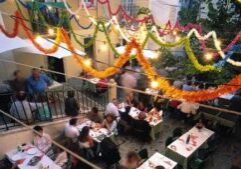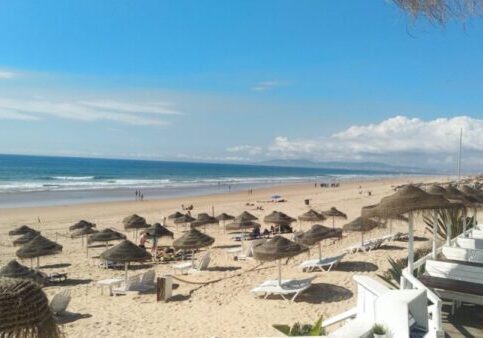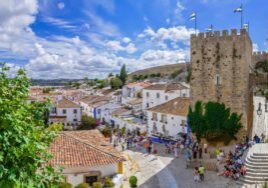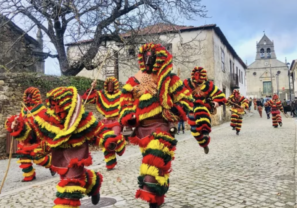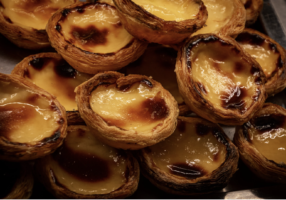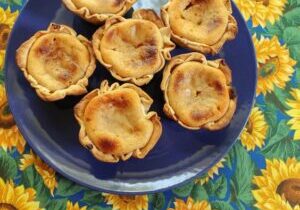6 Portuguese culinary specialities and their cities to discover
Today, I’m taking you on a tour of several Portuguese cities to introduce you to some of the country’s culinary specialties. A wide variety of specialities: dishes, desserts, drinks… all part of Portugal’s gastronomic DNA. We’re off!

1: Cozido das Furnas in the Azores
We often forget that Portugal comprises mainland Portugal and two archipelagos: Madeira and the Azores. Each of these archipelagos has its own culinary specialties. Today, I’d like to tell you about one of the specialties of the Azores, more specifically a specialty from the village of Furnas on the island of São Miguel.
This dish is “Cozido Das Furnas”, which means “cooked in the fumaroles” and is a kind of pot-au-feu cooked in the heat of the volcano. Volcanic activity is still very much alive on the island of São Miguel. The volcanoes are dormant, but hot springs and geysers are omnipresent.
In Furnas, in the “caldeiras” area, next to the lake, among the fumaroles, holes are dug in the ground to cook the famous local dish: Cozido. On the Portuguese mainland, it’s called “cozido à portuguesa”; in the Azores, because it’s cooked in the fumaroles of volcanoes, it’s called “cozido das furnas”.
This Portuguese-style stew is made with pork, beef, chicken, chorizo, black pudding, cabbage, potatoes, carrots and sweet potatoes. It’s made by local restaurants, who arrange all the ingredients in pots, then bring them down to the lake in the morning and put them in the holes. These are closed with a lid and covered with a white cloth, then plunged into small holes in the ground and covered with earth. The pots are cooked for around 6 hours using the steam from the volcano.
If you’d like to see how it’s done, you can come in the morning around 11 a.m., when the restaurateurs collect their pots. One of the most popular restaurants in Furnas is Tony’s.
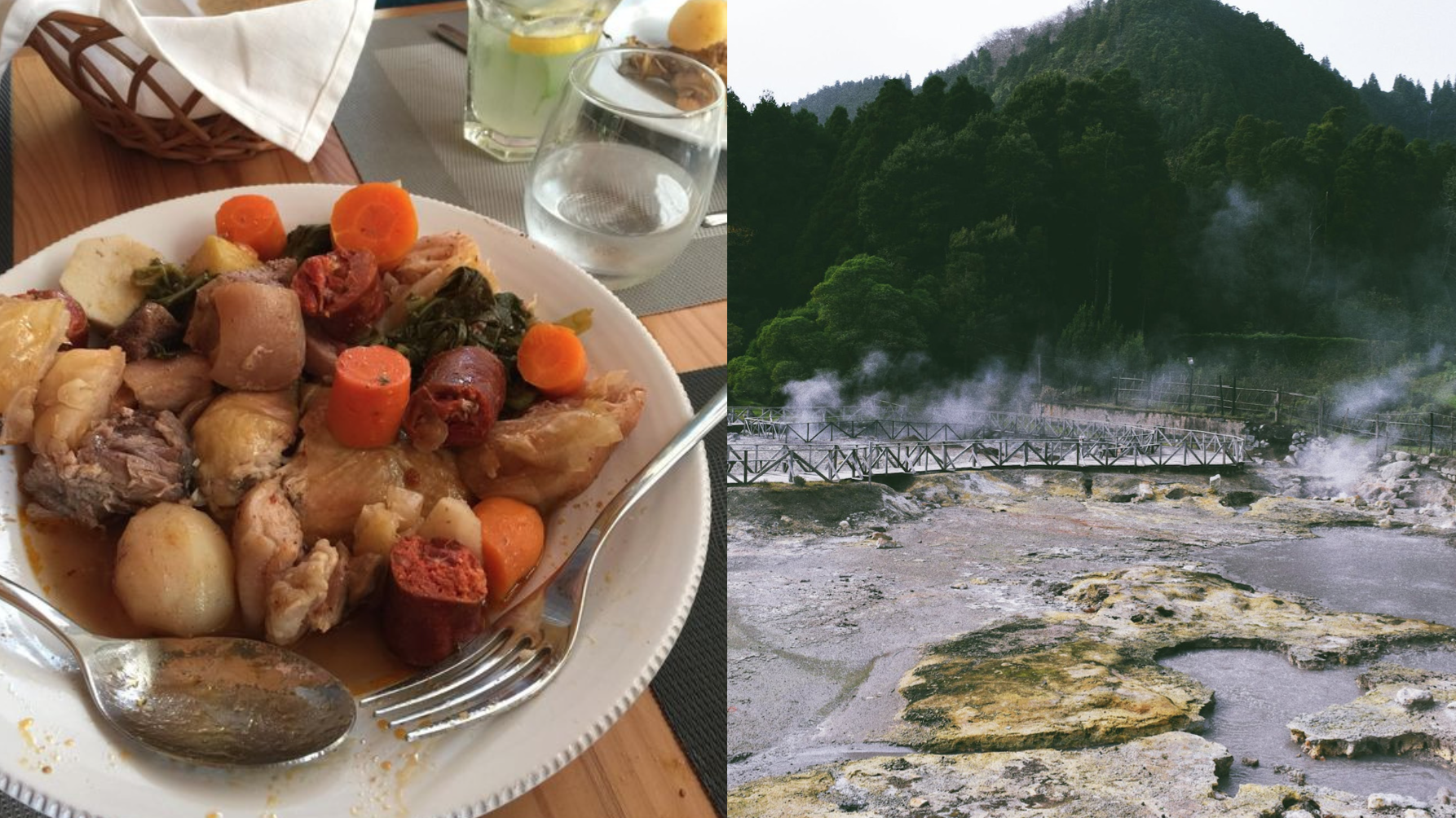
Cozido das furnas on the left and the Furnas fumaroles in which cozido is cooked.
2: Obidos ginjinha
Another of Portugal’s culinary specialities to discover is the “Ginjinha”. But what’s this funny big word? I’d never heard of it before moving to Portugal. In fact, I must admit that it was its “funny” name and the fact that I saw it on the facades of several small shops in Lisbon that initially aroused my curiosity. Ginjinha or ginja is a traditional Portuguese liqueur made from fermented Morello cherries, brandy and sugar.
Ginginha is made from the fruit of the same name: Ginja or Ginjinha, a red fruit with a sweet and bitter taste, similar to the Morello cherry. The fruit arrived in Portugal from Asia around the 15th century. Then, the origin of the recipe as we know it today would be a recipe of monks, who infused the Ginja fruit in brandy. Initially used as a blend for medicinal purposes, over time it became a popular Portuguese liqueur.
It is traditionally drunk in small chocolate cups, with or without the whole fruit (the Morello cherry) in the glass. If there’s a cherry, it’s called ginginha “com elas” (meaning “with them”), and if there isn’t, it’s called ginginha “sem elas” (meaning “without them”).
You’ll find this liqueur pretty easily anywhere in Portugal, even though it originated in the towns ofAlcobaça and Obidos, in central Portugal.
Don’t miss the chance to try it in one of the small Ginjinha bars, a typical and unique experience. These little bars are often hidden away around the corner, and very small indeed! A small glass usually costs €1/€1.50, while a whole bottle of Ginginha costs €15/€20. Here are two well-known addresses in Lisbon: Ginjinha Sem Rival, an institution over 100 years old whose current owner is the founder’s grandson, and A Ginjinha, also very well known, the first bar to sell espinheira ginginha in 1840.
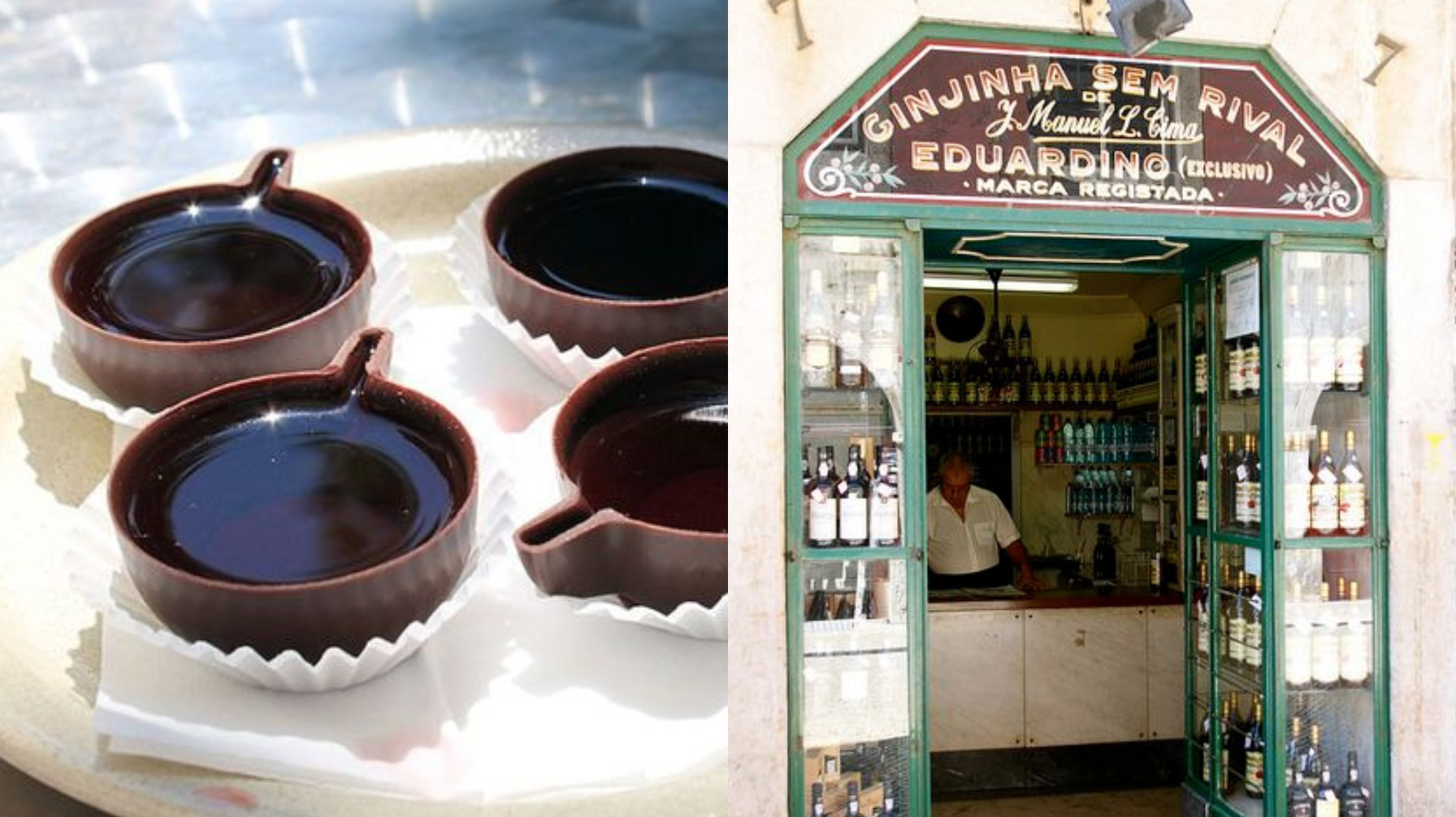
Ginginha in a chocolate cup on the left and a typical store serving ginginha on the right.
3: Alheira de Mirandela
Portugal’s north-eastern regions of Trás-os-Montes and Beira Alta include the town of Mirandela. Alheira is an essential sausage in Portuguese cuisine. The name alheira comes from the Portuguese word alho, meaning ‘garlic’. In 2011, this dish was named one of Portugal’s Seven Gastronomic Wonders. This sausage does not include pork. It’s made with poultry, bread, olive oil, garlic and chilli, and has a smoky taste. Alheira is eaten as a dish, grilled or roasted, then served with vegetables sautéed in garlic and potatoes, all drizzled with olive oil, as you’ll know by now if you read the blog regularly 🙂
For the record, in 1492, King Ferdinand of Aragon invaded the Alhambra Palace in Granada, Spain. Known as the “Catholic King” for his Christian devotion, he began persecuting Spanish Jews. Faced with the Spanish Inquisition, Spanish Jews fled to Portugal, where King John II gave them sanctuary until the 16th century. The Jews tried to pass themselves off as Christians. They attended mass, and in the Trás-os-Montes region of northern Portugal, the subterfuge went even further. As Judaism forbids the eating of pork, one of the ways the inquisitors discovered “liars” was to see if the door of their house had any pork sausages hanging from it. Mirandela, 149 kms from Porto. It was common to see families putting bunches of pork sausages outside, so it was easy to identify “foreigners”. The Jews then created this pork-free sausage… which resembled the traditional pork sausage. This is how the alheira was born. Later, when the Inquisition came to an end, alheira remained a traditional Portuguese dish.
This dish is widely eaten in the Mirandela region, particularly during the “festa de Mirandela em honra de Nossa Senhora do Amparo”, a traditional festival celebrated every year at the end of July/beginning of August, with 14 days of festivities.
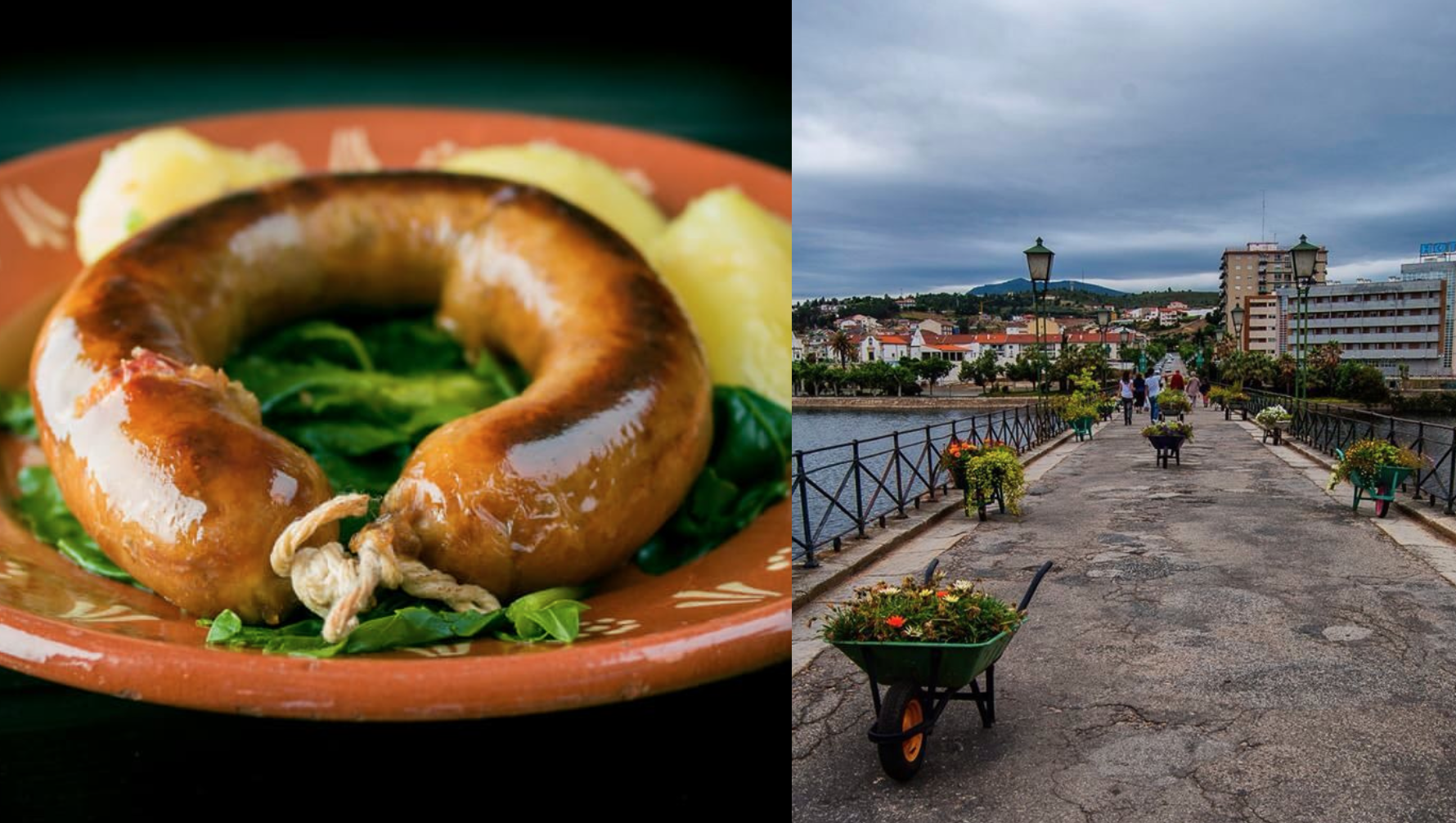
Alheira on the left and Mirandela on the right
4 – Aveiro’s Ovos Moles
Ovos moles” translate as “soft-boiled eggs”… not a very glamorous name, I grant you, but they’re one of Portugal’s specialties worth discovering. These soft-boiled eggs are a speciality of Aveiro, a small coastal town south of Porto that I often talk about here on the blog, but also on theVivre au Portugal Instagram (by the way, don’t forget to follow the Instagram page for even more Portuguese travel).
Ovos moles are a confection made from egg yolks, sugar and water, wrapped in a thin layer of hosts. The traditional shapes of this delicacy are fish or shells. I’d like to warn you, though, that you’d better love eggs, as the taste of egg yolk is quite strong. I’ll be honest with you, personally I wouldn’t fight to buy a box because I’m not a big fan, but I think it’s always interesting to taste a product typical of the country, so I invite you to make up your own mind. What’s more, ovos moles are a Portuguese culinary specialty that you won’t find anywhere else, so you might as well make the most of it if you get the chance to try it… You don’t have to die stupid, do you 😉
Today, the recipe for “ovos moles” is “protected”. They can only be produced in the Aveiro region. In fact, it was the first Portuguese culinary specialty to have its recipe protected. Aveiro’s “ovos moles” generate sales of over 5 million euros a year! Quite a business!
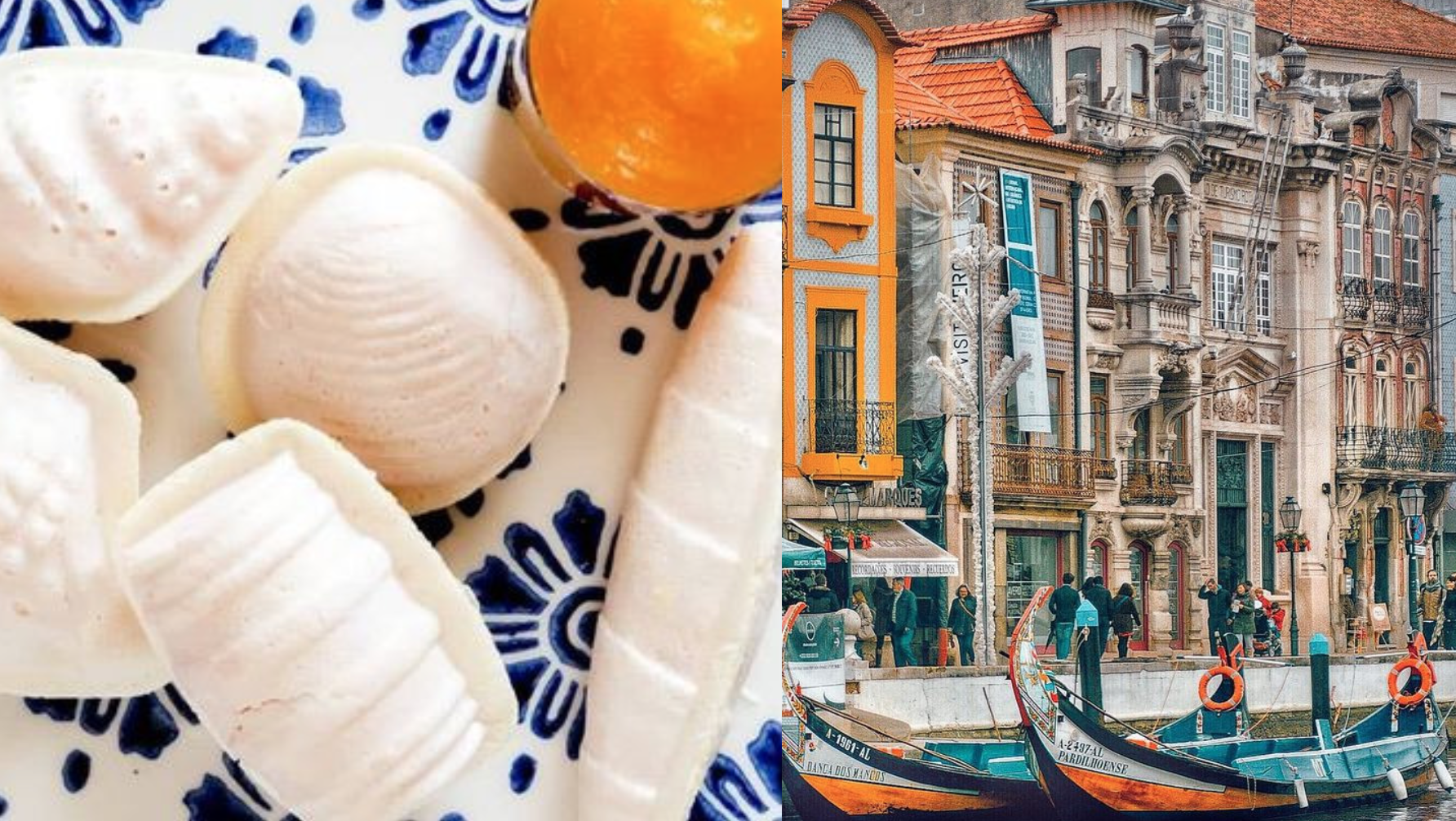
Ovos moles on the left, Aveiro town center on the right
5 – Choco frito de Setubal
“Choco frito”: if you try to guess what this dish is from its name, you might think of “chocolate” because of “choco” and “frit” for “frito”, but is “choco frito” fried chocolate? Hummmmm … Not at all! Choco frito is fried cuttlefish.
Choco frito is a traditional Portuguese dish from the Setubal region, a small fishing town 40 minutes south of Lisbon, close to the magnificent coastline of the Serra da Arrabida (for me, the most beautiful beaches in Portugal)!
Cuttlefish is boiled with garlic and bay leaves, marinated in lemon juice and wine, then breaded in corn flour before being deep-fried. This fried dish is accompanied by … hold on to your hat … French fries … so, as you can see, it’s not a very “light” dish, but if you’re visiting Setubal, it’s THE dish to try, as it’s THE city’s specialty. I assure you, in addition to the French fries, there’s also salad and lemon slices to squeeze the lemon juice over the choco frito, a little tangy touch that reveals the dish.
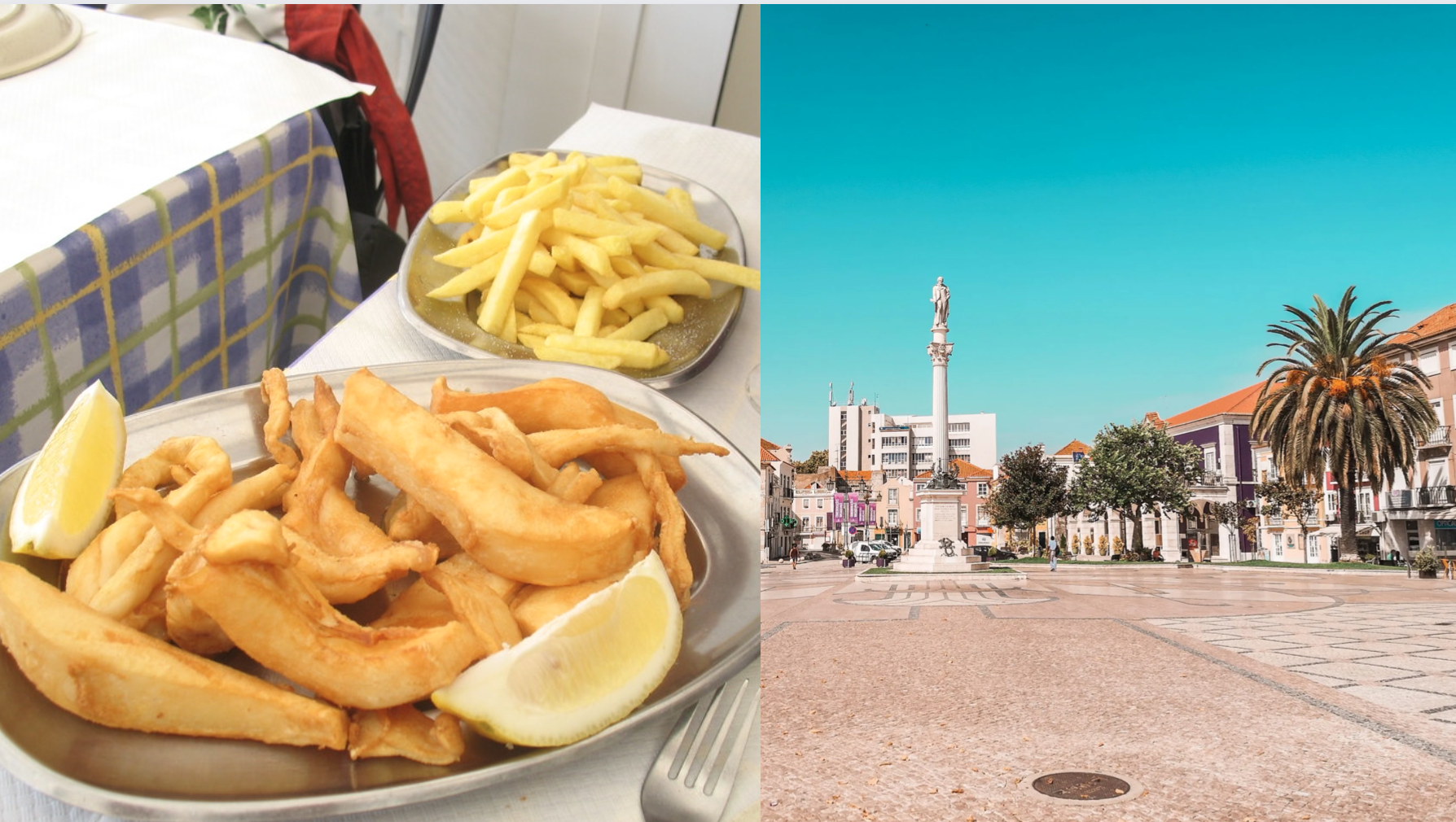
Choco frito on the left and downtown Setubal on the right
6 – Leitão da Bairrada
Suckling pig da Bairrada is one of the must-try dishes of the Bairrada region, more specifically of the town of Mealhada, in central Portugal, between the pretty cities of Coimbra and Aveiro, which I mention in my article 4 central Portuguese cities you’ll love.
Grilled suckling pig is relatively uncommon in France, whereas in Portugal, it’s a highly prized dish. As you may have guessed, it’s a suckling pig, barbecued for several hours and served with French fries or bread like a sandwich.
It’s so popular in the Bairrada region that every year there’s even a festival dedicated to the suckling pig called the festa do leitão da bairrada. The date for 2023 has not yet been set, but Portugal’s “festas” are always lively and typical, so don’t miss them if you’re in the area and want to soak up even more Portuguese culture. Last year it was the 27th Festa do Leitão da Bairrada in the small town of Agueda.
In terms of places to try Leitão de Bairrada, you’re spoilt for choice. I recommend going to Mealhada, the birthplace of this Portuguese culinary specialty. The Pedro dos Leitões restaurant, an institution that claims on its website to have been the first to serve this specialty. Castiço is another popular restaurant, open since 1975.
My little tip: Melhada is located on the freeway between Porto and Lisbon, so take the opportunity to take a short break and sample this Portuguese culinary specialty. On the other hand, don’t be afraid of the decor of the restaurants, which are often “in their element”, with wooden tables and chairs, and not very modern decor… It’s in these restaurants that you’ll eat the best in Portugal! Believe me: the “uglier”, the better 🙂
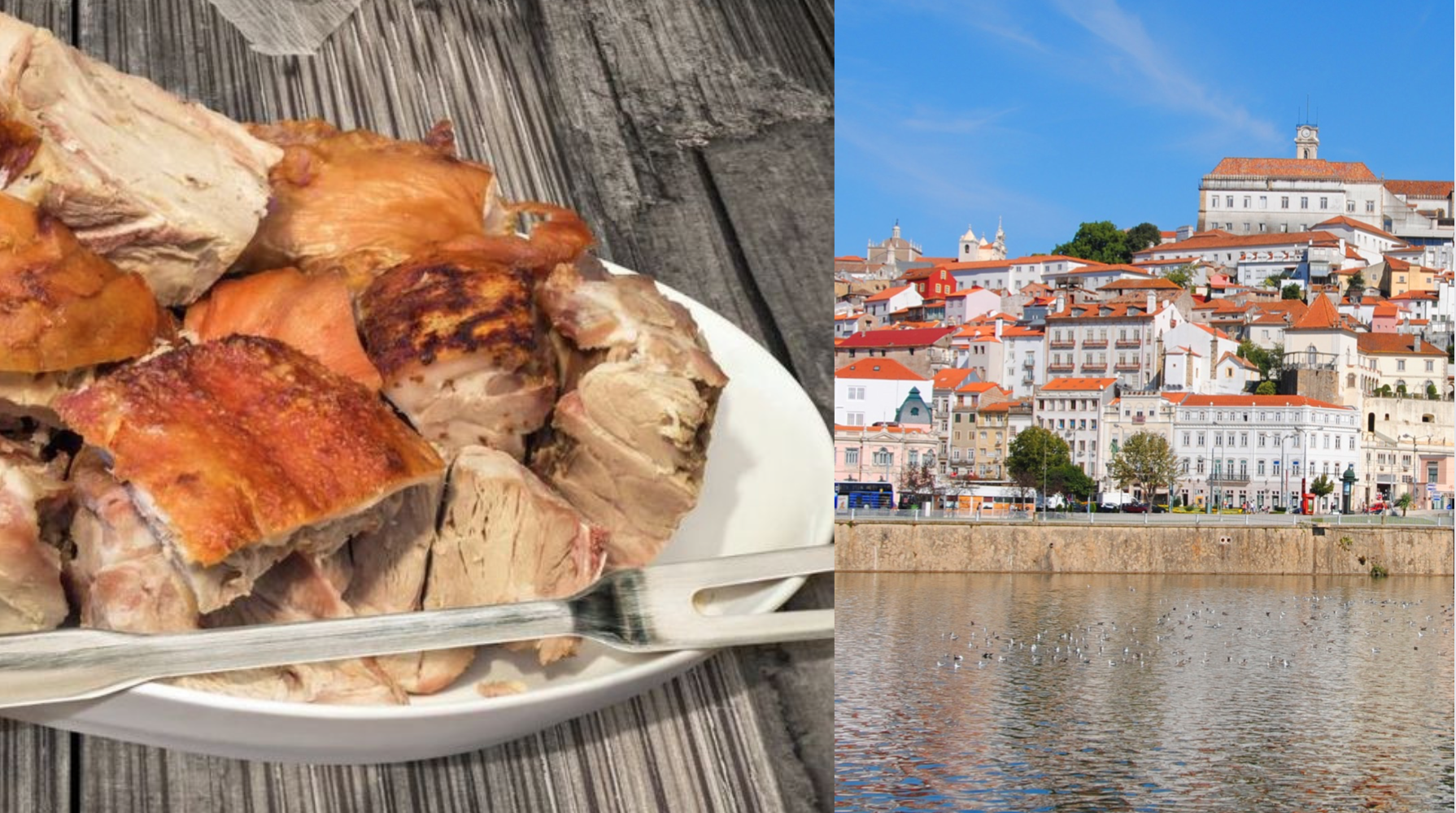
Leitão on the left and downtown Coimbra on the right
In conclusion
I’m repeating myself here, but Portugal’s history, traditions and culture are well reflected in its gastronomy. So, discovering Portuguese culinary specialties will really allow you to immerse yourself in Portuguese culture. My advice is to dare to try and not be afraid to step out of your comfort zone. I also urge you to ask for the specialty of the city, region or restaurant.
Join us on social networks!
- Facebook group “Amoureux du Portugal”,
- Vivre au Portugal” Facebook page
- Instagram ” Living in Portugal
Articles Populaires
dernières annonces

2 bedroom apartment with sea view, 10km from Lisbon and 2km from the beaches
Rua da Bica, 103Discover this magnificent 2 bedroom apartment with views of Arriba Fóssil and the sea, 2km…

Duplex apartment with sea view 15 minutes from Lisbon
rua Santa Teresa 7Bedroom + duplex apartment with sea view and 15 minutes from Lisbon.

Single-storey house with swimming pool
Just a few meters from the magnificent bay of São Martinho do Porto, lies this…
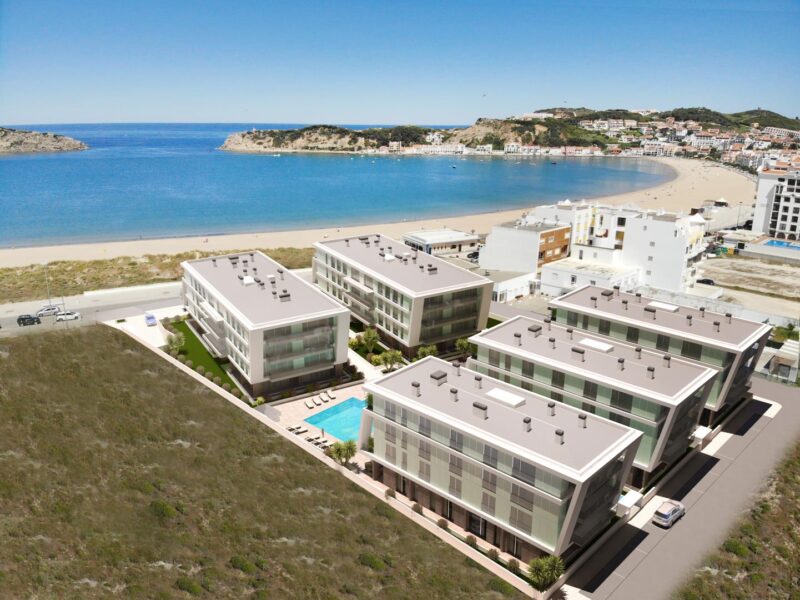
Condominium apartments facing the sea
São Martinho do PortoBeautiful apartments in São Martinho do Porto “Janela da Baía”! Located in the heart of…

Villa already finished and ready to move in: 4-suite bungalow on 750m2 plot in a quiet area of Azeitão
Rua de ParisHouse already finished and ready to move into! Close to shops and services, quick access…

Magnificent house with basement, indoor and outdoor pool in Verdizela/Aroeira
Verdizela/AroeiraNew turnkey project: magnificent single-storey villa, 498m2 in surface area, high-end finishes on a 1875m2…

Luxury apartment on the edge of a nature reserve
Your modern, spacious apartment between the beach and Lisbon’s capital. – Beach 5min – Golf…
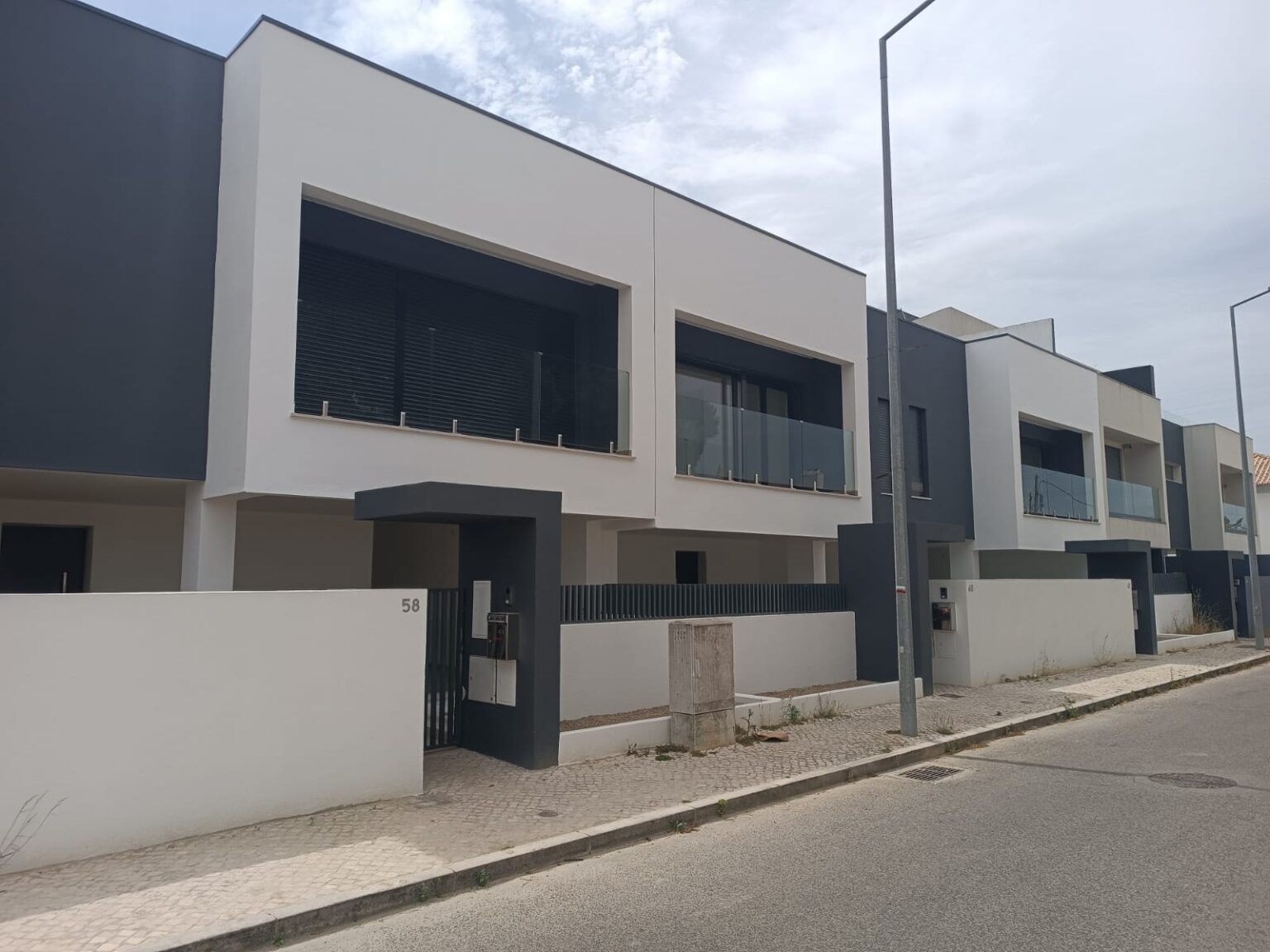
House T3 1 10 min from Lisbon and 5 min from the beaches
PêraREADY TO MOVE IN! New T3 1 ready-to-live-in house in a quiet, rural neighborhood with…

4 bedroom villa with pool and jacuzzi in Aroeira
rua são miguelModern, minimalist architect-designed house with exceptional details in a quiet location in Aroeira 2-storey house…
Inscrivez-vous à notre newsletter
Recevez chaque mois les derniers articles de notre blog "la vie au Portugal" et notre sélection de biens immobiliers à vendre.



